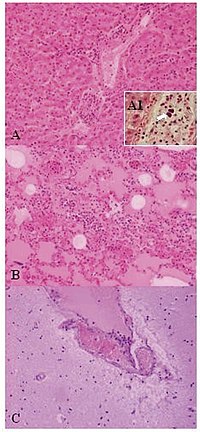
Photo from wikipedia
Extended-spectrum β-lactamase (ESBL) positive bacteria are emerging pathogens causing disease like sepsis. Diseases caused by these organisms have become a challenge; because these organisms are getting resistance against almost all… Click to show full abstract
Extended-spectrum β-lactamase (ESBL) positive bacteria are emerging pathogens causing disease like sepsis. Diseases caused by these organisms have become a challenge; because these organisms are getting resistance against almost all the recommended antibiotics used for its treatment. In the present study, in vitro antimicrobial effects of kimchi isolate Weissella confusa (DD_A7) has shown the ability to trigger an oxidative attack and limits the growth of multidrug-resistant (MDR) ESBL positive E. coli bacteria. The dose-dependent and time-dependent potential of cell-free culture supernatant (CFCS) were evaluated on the exposure of targeted pathogenic bacteria and has shown the maximum cell death upon treatment. Fluorescence and scanning electron microscopic analysis have confirmed the potential of CFCS to damage the cell membrane of the pathogenic bacteria. Moreover, in the study, we have also shown the capability of DD-A7 to reduce inflammatory cytokines in the host cells. Nevertheless, our study has revealed the prophylactic activity of DD_A7 against the invasion of pathogenic bacteria ex-vivo and possesses the non-hemolytic activity on mouse blood cells. Taken together, the present study successfully describes DD_A7 as a natural and alternative prophylactic agent against the ESBL-positive E. coli bacteria.
Journal Title: Microbial pathogenesis
Year Published: 2019
Link to full text (if available)
Share on Social Media: Sign Up to like & get
recommendations!